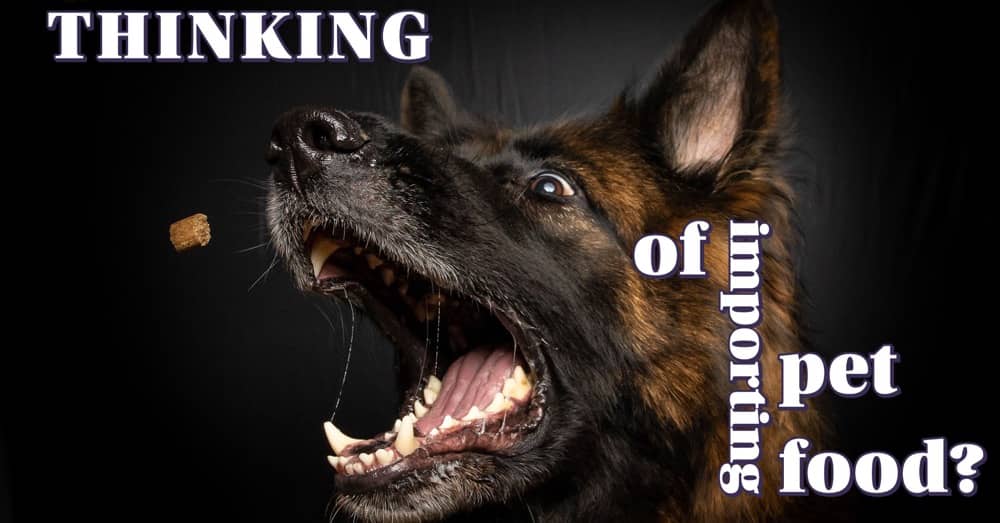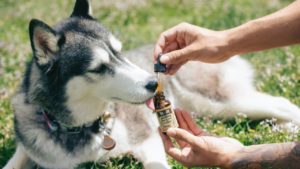
Importing Pet Food – Be Aware of Strict Requirements
5-minute read
New Zealand has a strong import demand for pet food as the country has a large pet population. In fact, New Zealand has one of the highest rates of pet ownership in the world, according to Trade Data Monitor, with nearly half of all households owning a cat, and around one-third owning a dog.
Consumers also have high spending power, making it an attractive market for pet food.
Importing pet food
Pet food and dietary supplements for pets must meet strict requirements to enter New Zealand. Requirements vary depending on the type of product and the country of origin.
The requirements prevent unwanted diseases and pests from entering the country and minimise public health, animal welfare, and trade risks.
Below is a step-by-step process so you can see what’s involved.
STEP 1: WHAT YOU NEED TO KNOW
An overview of importing pet food from start to finish.
Types of Pet Food for Import
This import process covers pet food, dietary supplements, and animal by-products for use in pet food, including:
- processed pet food in sealed packaging and containers;
- dog chews;
- processed pet food from fish material;
- frozen kangaroo and rabbit meat from Australia;
- animal by-products for further processing.
To successfully import pet food and dietary supplements for pets, you need to know about:
- your product, what it contains, where it’s from, who made it, and how it was made;
- the biosecurity Import Health Standard (IHS) for your product and meeting its requirements;
- whether or not you need to apply for a permit to import;
- Agricultural Compounds and Veterinary Medicines (ACVM) Act requirements;
- packaging and labelling requirements;
- relevant fees and charges.
Post-clearance conditions may apply
Some of the pet food or animal by-products you’re importing may have post-clearance restrictions applied to them. For example, spray-dried pig plasma must be processed into retorted cat food (retorting is an in-package sterilisation process).
The IHS (Import Health Standard) for your product will specify whether any post-clearance conditions apply. Check your IHS carefully.
STEP 2: WHAT YOU NEED TO DO
The tasks you need to complete.
Meet biosecurity requirements
Biosecurity requirements are detailed in documents called Import Health Standards (IHS). The IHS for your product tells you what you need to do to import it successfully.
Often you can only import certain products from the countries listed or named in an IHS. You can find the IHS for your pet food product here.
If there’s no IHS for your product, you can’t import it. However, you can ask MPI to develop an IHS for the type of product.
To request a new IHS
Use a separate form for each commodity and email or post your form and any additional information to MPI to make a request.
MPI prioritises each request for a new IHS, which may take several years to finalise.
Apply for a permit, if needed
For most products, an import permit isn’t required if it meets the requirements specified in the IHS. If your product doesn’t meet IHS requirements (for example, if it’s not cooked to the time-temperature conditions listed in the IHS), ask for advice by sending an email to MPI.
Meet ACVM requirements
Pet foods and dietary supplements for pets are classed as oral nutritional compounds (ONCs) under the Agricultural Compounds and Veterinary Medicines (ACVM) Act 1997. Many ACVM products have to be registered.
Normally, pet foods and dietary supplements are authorised under the ACVM Act by an ‘exemption under regulations’. This allows you to import, manufacture, sell, or use the product without registration, if you:
- comply with the conditions of the exemption;
- don’t make claims that the product prevents or treats disease.
Exemption conditions are outlined in the ACVM (Exemptions and Prohibited Substances) Regulations 2011 (entry 25 in Schedule 2). You can read the ACVM regulations – New Zealand Legislation website here.

Confirm your product is fit for purpose and safe
You must comply with the requirements in the ACVM (Exemptions and Prohibited Substances) Regulations 2011. For example, ensure your product is ‘fit for purpose’ and all the ingredients are safe.
If you alter the product or its labelling, you will be classed as a manufacturer under the law and subject to the minimum manufacturing requirements. You can find out more about the ONC’s and ACVM here and read the ACVM act – NZ Legislation website here.
Request a class determination, if needed
You may need to get a class determination letter from MPI confirming that your product is exempt from registration. A fee applies, and you’ll need to give the letter to MPI border staff when your goods arrive. This is only required if the product isn’t obviously exempt, for example, if a label suggests the product has a therapeutic effect.
Ask MPI if you’re unsure
If you’re uncertain about your pet food’s status, you can ask MPI to determine this for you. Fees apply for MPI’s ‘class determination’ service.
Get your product registered, if it’s not exempt
Products that don’t meet the criteria for exemption usually must be registered with ACVM before they’re imported. Note, registration may take several months. Find out how to get your product registered here.
Prepare your documentation
Your consignments must be accompanied by the documents listed in the IHS. The documentation may be in multiple languages, as long as English is one of them.
MPI will assess your documents when your consignment arrives in New Zealand.
STEP 3: GETTING YOUR IMPORT DOCUMENTS
Your pet food, dietary supplements, and animal by-products will be cleared for entry into New Zealand when you have:
- completed all of the steps required by the import health standard (IHS) for your product;
- included the zoosanitary certificates (if required) and supporting documentation from the exporting country;
- received a permit, if required;
- received a class determination letter, if needed;
- had your products inspected and given clearance by an MPI quarantine inspector.
If your product doesn’t comply on arrival
If your pet food, dietary supplements, or animal by-products don’t meet the IHS and ACVM requirements, they will be held at the port of arrival. If there is any doubt whether your goods are authorised under the ACVM Act, they won’t be cleared.
Following assessment, an MPI inspector will advise you to either:
- treat the product;
- reship the product to another destination;
- destroy the product;
- ask for the product to be held until you can confirm it’s authorised.
You are liable for any costs associated with non-compliance.
The above information is intended as a guide only. Regulations can change without notice and for specific guidance, questions about importing pet food or animal by-products for use in pet food, please visit the MPI website or email animal.imports@mpi.govt.nz or approvals@mpi.govt.nz for ACVM requirements.
Source: Ministry for Primary Industries
P.S. Easy Freight Ltd helps New Zealand importers & exporters to save money on international freight and reduce mistakes by guiding how to comply with Customs and biosecurity rules.
➔ Contact us now to learn how we can assist you.
